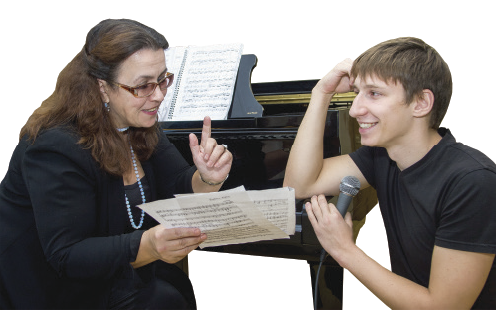
I was greatly impressed with the College where the seeds are sown for tomorrow’s great oaks: not trees, but musical performers. I admire the professional mastery of today’s popular singers, but they rarely move my emotions, lacking natural sincerity. I never feel that I’m seeing their true inner world. However, some rare treasures do appear from time to time, such as the young girl from Denmark who won Eurovision-2013, Emmelie de Forest. She not only shone but radiated the warmth of her soul — unlike the grimacing dolls and jumping marionettes we often see. Of course, various singing genres exist and that the technological age dictates its own laws; such is life. However, we shouldn’t lose sight of our values, as teacher, composer and experienced specialist Yelena Atrashkevich would agree.
Her heading of the Variety Art and Singing Department for seventeen years definitely inspires hope, being the founder of the famous Spyavaem Razam (Singing Together) amateur choir. I believe that the issue is about the pressure of work. In 2008 she became a member of the National Assembly of the Republic of Belarus, stating that she was, foremost, a creative person, who promoted her profession. However, she wished to bring her experience to bear, influencing wider national issues. She undertook her job at Minsk State College of Arts with the same mission: to help others.
Moreover, she was awarded for her contribution to the creative development of Belarus: the ‘2,000 Years of Christianity’ badge of honour. In fact, Yelena composed the Minsk Region’s anthem.
Here, we discuss education at the College of Arts, how to perfect vocal skills and the difference between European and Belarusian singing.
Your faculty is young. Do you already have any notable achievements among your students?
A great many actually. One of our graduates, Zhenya Slutsky, won the ‘Academy of Talents’ show, on TV. Meanwhile, Ksenia Zhuk — now a well-known Belarusian performer — used to be part of such choirs as ‘Sonika’ and ‘Navi’; she’s often invited to sing with the Presidential Orchestra. Yevgeny Dolich is a laureate of various national competitions and took part in ‘Slavianski Bazaar’ in 2012. Another of our students is Alina Molash, aged 17, who sang in a trio in the ‘Junior Eurovision’ Song Contest; this year, she won the Grand Prix at the Song and Poetry Festival. I have no doubt that she`ll go on to greater fame. Misha Sosunov, in his third year of study with us, managed to get through the tough selection rounds for Russian TV show ‘I Want to Meladze’. Roma Voloznev, one of the winners of the children’s ‘New Wave’ Festival, is now working with Vladimir Presnyakov — a well-known Russian singer; Roman also composes music. Yekaterina Khutinets, Alexey Gross, and many others whom I cannot list, have won national and international singing competitions and have been granted sponsorship from the Fund for the Support of the Talented Youth of the President of Belarus.
Just five years — and such significant successes! You must use an individual approach for each pupil?
Of course. We work selectively with children and even dissuade many from entering our college. We have excellent teaching staff, and our management trusts me in guiding them. Our profession is difficult, although it may appear easy and cheerful from `outside`. To become a high-quality performer takes enormous work. Besides singing, you need to develop your sense of taste and style. Intelligence is also vital, since variety demands respect. These are obligatory components for a modern variety singer. We have a new generation of educated people, not only from the point of view of singing, but regarding their internal feelings. You need depth. We take on students aged 15 and above, and they tend to be mature for their years. Our programme is demanding and requires a lot of dedication. You need to feel singing as your vocational passion. As a young person, you are full of energy. This ‘power’ can take you in various directions, but we try to guide our students towards professional accomplishment.

Yelena Atrashkevich with Alexander Savanets, laureate of the republican competitions, at the vocal lesson
What do you look for in your students?
Self-sufficient and happy people who are eager to choose this profession. I look for determination and passion and the desire to improve. They sometimes wonder if there is room for them in this niche, but there is always room for more talent.
I heard you remark to a student singing ‘Baby You’ that they should sing in European style rather than Slavic. What is the difference between a Western European performance and a Belarusian one?
West European and American musical cultures provide children with good, high-quality material, which they enjoy. They can even become over-influenced: ‘hooked’. They don’t understand that we don’t want them to copy the style of Céline Dion or Christina Aguilera. We need to be able to hear a performance of ‘Kalinka-malinka’ in good Russian, without an accent (otherwise, for me, it`s kitsch). Europeans feel the same way about us singing in English, since we cannot help but mangle words and lack correct intonation. It may be ‘cool’ right now to use just three notes and two chords but that may not be so tomorrow. My task is to familiarize my students with the creativity of timeless composers of Belarusian and Russian classics, and to inspire enjoyment of such music. These works use melodies which have their own sense of drama and progression, building like a wave. Think of Tchaikovsky, Isaak Dunayevsky and Maxim Dunaevsky: my God, what harmonies! Jazz compositions cannot compare. Once children try these harmonies, they never look back! Moreover, I give them songs by Igor Talkov and Alla Pugacheva, for them to interpret individually, breathing new life into them. I do believe that we shouldn’t just repeat the same singing of days gone by; style should reflect modern trends, building upon well-known Slavic melodies. There’s no need to try and fill ‘dead men’s boots’ but nor should we let traditional singing die.
What do you mean?
We need to have good musical taste: to truly feel a song, and understand the warmth of the Slavs. A performer should be predisposed towards this. There’s no need to simplify an old Belarusian song and just adding syncopation does little to enhance it. It may work for a Russian, Ukrainian or English song, but it is impossible for a Belarusian song. Our rich song culture was formed over decades and centuries so, if we turn our back on it, it will be lost forever.

In the classroom of pedagogue Svyatlana Borakhava
Do you promote our national creativity?
We must all try to do this; it`s essential. Last year, we hosted an event celebrating a decade of Belarusian music, inviting Eduard Khanok, Dmitry Dolgalev and other composers and performers. The children were impressed by the sincerity and depth of the performances, and understood that Belarus has many layers of spiritual culture. Is that not beautiful?
They all sing European songs but Europe does not sing our songs. Why?
You shouldn`t forget that we are part of Europe — yet different, since our art is more emotional. Western Europeans also sing with emotion but they express this differently. Our texts are deeper and more poetic. In terms of melodiousness Belarusian is second only to Italian. It is made to celebrate beauty! Its phonetics has something in common with those of Western Europe, although few realize it. When we take Belarusian groups to tour Western Europe, they ask us to sing our songs, as they want to hear the language.
So, we should embrace our roots?
Folklore is the repository for all world knowledge, storing it for following generations. Should we turn our back on such rich heritage, following fashions instead and adopting modern trends, which come and go? It is surely wiser to embrace our roots, which enrich our national creativity. Our Divine gift to elicit beautiful sounds will bring greater harmony to the world.
Can art change the world for the better?
Can you imagine your life in black-and-white, without music? When you suddenly hear a melodic phrase, does it not stir you? I am convinced that art and culture can shape our bitter world for the better. Children engaged in creativity are different, having a special view of the world, with other priorities and a greater awareness of their emotions. They are not afraid to be sentimental, which makes them more tolerant, and kinder to others.
Interviewed by Alisa Krasovska











